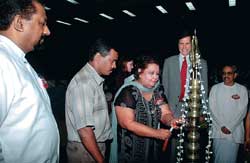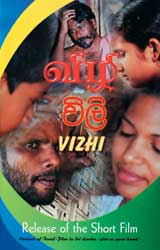
Renaissance of Tamil cinemaBreaking a nearly 25 year long silence, Tamil film production in Sri Lanka has returned. The happy news comes with the release of 'Vizhi', a short film directed by Selvan (S. Kagiladegaran) and produced by Udeshtron (S. Ravindra). Starting in 1961, Sri Lanka had the good fortune of enjoying a rich Tamil cinema over a period of two decades. Unfortunate disaster fell on the entire Sri Lankan film industry with 1983 riots inflamed by racists. Though the film halls were burnt down giving a death blow to Sinhala cinema when compared to the tragedy that befell Tamil cinema it was minimal. Production of Sinhala films continued and at least a few new film halls were built whereas production of Tamil films came to a complete standstill. We today experience the repercussions of the tragedy that fell on Sri Lankan Tamil cinema. As a result of this Sri Lanka created a market for trashy and cheap adults only Tamil films in place of a culturally and artistically rich Tamil cinema.
During the period between 1961 and 1983, Sri Lanka had made 24 original Tamil films and four Sinhala films dubbed into Tamil. If the trend had continued Tamil films made in Sri Lanka would have come to a significant number and Sri Lanka would not have lost a golden opportunity of being Tamil film exporter to a many a country with a Tamil diaspora. The greatest loss as a result of the destruction of Tamil cinema was the talent that was lost to the country in the personalities of film stars and technicians. Against this backdrop, a ray of hope, 'Vizhi' is a 29 minute long film based on a family caught up in the ethnic conflict. It is played by an entirely Sri Lankan cast with a full crew except for a cameraman from Chennai. The film was screened to a distinguished gathering including intellectuals, filmmakers and film artistes in a Sinhala cinema hall where veteran filmmaker Ms. Sumithra Peries was the chief guest. "We had to hire a cameraman since we wanted to have a film that could compete with international standards and markets," said Udeshtron, the film producer for Lumiere Brothers' Motion Pictures. Udeshtron earlier had made two films which were screened in Chennai. Both films were based on Sri Lankan stories. "It was not due to the lack of talentthat we could not make Tamil films here. It was purely due to other problems we had to face," he explained. "There is a big worldwide market for Tamil films and there is a large audience all over the world. We can easily earn foreign exchange by exporting films from Sri Lanka,'" the producer said. "Our main target is to make feature films and hopefully we will start it soon," he said on an optimistic note.
The producer has made arrangements to release the short film in international television channels mainly used by Tamils around the world."Discussions are underway with some TV channels in London and Canada," Udeshtron said. However making the film under the present security situation in the country, the director and the film crew had to face many a hardship. The worst of it was the film director Selvan (S. Kagiladegaran) had to be in remand for thirty days after he was arrested by the Slave Island police during the production. The director was arrested at a private colour lab and a communication centre when he tried to get some computer designs done of an army personnel to be used for the film. Speaking on international promotion of Sri Lankan cinema, the producer stated that the authorities must make the necessary arrangements for filmmakers to reach the foreign market."India can send here any book or a film without any problem. But if we had to export anything to India we have to undergo many a financial constraint," film producer complained.
Under the present SAARC agreements we can export films within SAARC countries and the National Film Corporation and the other relevant authorities have the responsibility to clear the way for filmmakers. Queried on the development of Tamil cinema, National Film Corporation Chairman, Asoka Serasinghe said that it was a welcome move that the corporation was ready to support. ‘We have conducted a short film festival with the hope to bring forward Tamil filmmakers’ he said. Setting aside ethnic differences, Dharmasena Pathiraja made Ponmani (Younger Sister) in 1978. The film which represented Sri Lanka at the International Film Festival in India, 1977 is about a starkly different socio-economic culture and political climate and problem of dowry. Set in the northern city of Jaffna, it traces the fortunes and concerns of an economically depleted upper caste lower middle class family. Ponmani, the youngest daughter of the family, has to wait until the marriage of the elder sister Saroja, before she can escape the bareness of her life in the house. It starred Subhaisni Balachandran, Kamala Thambiraja and Dr. Nandi. |
|| Front
Page | News | Editorial | Columns | Sports | Plus | Financial
Times | International | Mirror | TV
Times | Funday
Times || |
| |
Reproduction of articles permitted when used without any alterations to contents and the source. |
© Copyright
2007 | Wijeya
Newspapers Ltd.Colombo. Sri Lanka. All Rights Reserved. |



